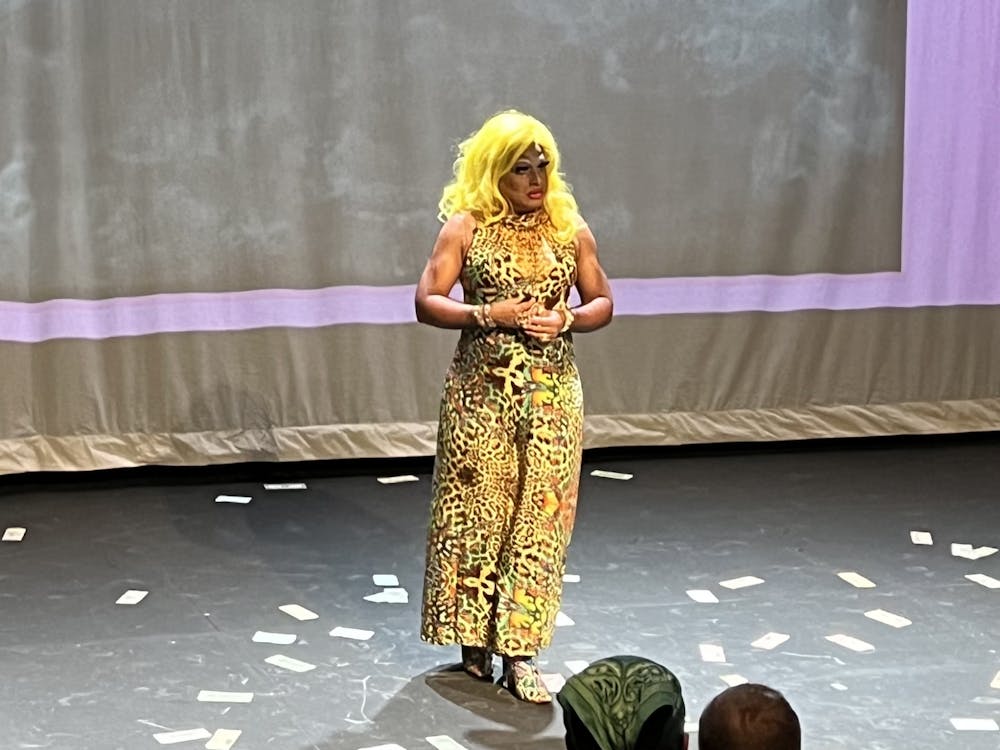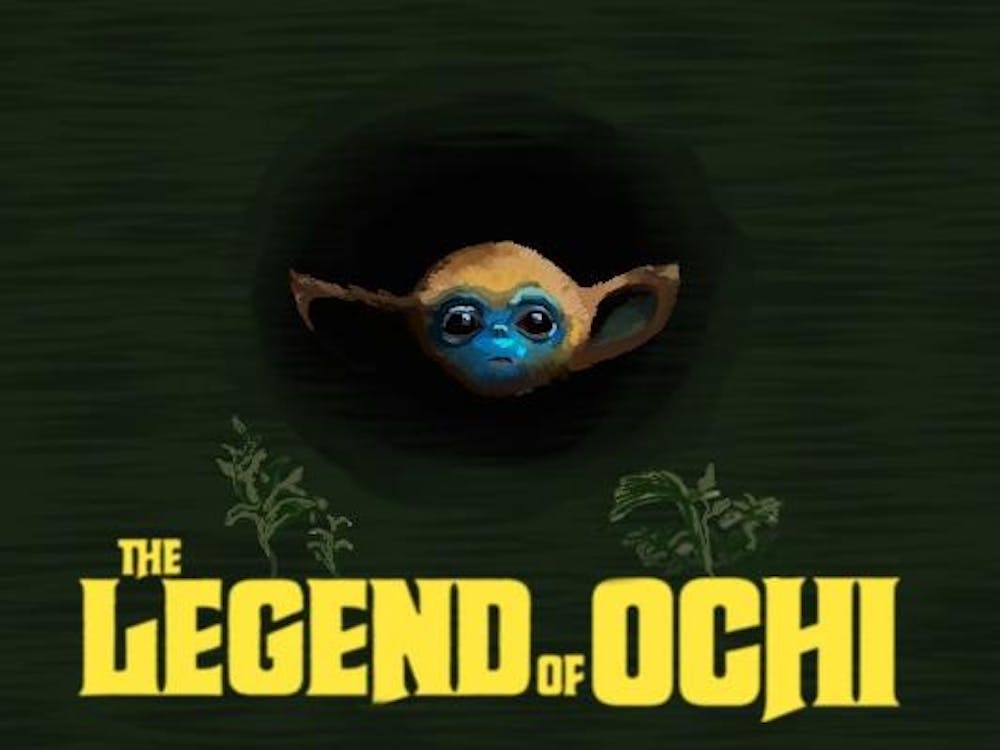Boston-based desi drag artist Dr. LaWhore Vagistan brought queer nightlife to the Helms Theatre Friday evening, blending instruction and seduction at her “Lessons in Drag” performance. Her set alternated between a slide-deck presentation reminiscent of a university lecture and lip-synch sequences set to mashups of Western and South Asian popular music.
As the drag alter-ego of Dr. Kareem Khubchandani, associate professor of performance studies, queer studies and South Asian studies at Tufts University, Dr. Vagistan grounds her performance in research on such topics as South Asian nightlife, globalization, assimilation, the model minority myth and transnational feminism.
Dr. Vagistan’s performance wrapped up a weekend of Queer Performance programming organized by the Race & Performance Lab, a project of the University’s Institute of the Humanities & Global Cultures. The two-day festival also featured a poetry reading by dancer and performance artist Benji Hart, a poetry writing workshop led by Hart, a panel featuring Hart and Dr. Vagistan and a Critical Drag Workshop led by Dr. Vagistan in the University’s Queer Center.
The facilitators of the event — and of the Queer Performance festival as a whole — hoped to bring the IHGC’s work to new audiences, particularly undergraduate students. Fiona Ngô, director of the Race & Performance Lab and associate professor of American studies, spoke to the ways drag can educate and entertain a diverse audience.
“Drag is not just for queer people or queens,” they said. “As college students, people are often coming into themselves in different ways and learning new things about themselves. I think drag gives you an opportunity to assess yourself and to love yourself.”
“Lessons in Drag” drew a diverse crowd of undergraduate students, faculty and community members representing a range of ages, ethnicities and academic backgrounds. The air buzzed with excitement before the performance as audience members chatted over appetizers in the drama department lobby.
Once the performance began, Dr. Vagistan swished onstage in a patterned dress cinched at the waist, lip synching to a mashup of Adele’s “Easy on Me” and “Tum Hi Ho” by Arijit Singh. A pulsing, rainbow-colored light sparkled off her necklace and stacked bangles.
When in drag, Dr. Vagistan uses she/her pronouns and also takes the pronoun “auntie” in homage to her mother and the circle of South Asian matriarchs who inspired her drag persona. Her drag name is a euphemistic pun on Lahore, a city in Pakistan, and the suffix “—stan,” shared by Asian countries like Pakistan and Afghanistan.
After explaining this etymology to the audience, Dr. Vagistan projected a map of the South Asian subcontinent onto the screen behind her. Superimposed over the map — an anatomical drawing of a vagina, which drew laughs and claps from the audience.
Dr. Vagistan’s performance employed stand-up comedy, dance and multimedia elements. She notably shared her 2016 music video “Sari” — a parody of “Sorry” by Justin Bieber — and a clip from her TEDxTufts talk, “How to be an Auntie.”
Dr. Vagistan bills herself as “everyone’s favorite overdressed, overeducated, oversaturated desi drag aunty.” With intellectual prowess and flirtatious dominance, she held the audience in the palm of her hand throughout the night.
“I’m a drag queen with a clicker, so I’m very powerful,” she said, a coy smile playing on her painted lips.
Throughout the night, Dr. Vagistan called on the audience to actively participate. She invited six audience members to join her in a Zumba dance and asked another audience assistant to help her with a backstage quick change. Leaning into her dominant stage presence, Dr. Vagistan encouraged all audience members to ask questions after the slide deck segments of her performance.
In another vignette, Dr. Vagistan explored the trend of South Asian preoccupation with hyper-education. She focused in particular on the string of South Asian winners in the Scripps National Spelling Bee — a public forum for academic competition and a highly visible marker of intellectual dominance, according to her.
“Young people are forced to live their parents’ assimilationist dreams,” she said.
Then she broke into a rousing lip-synch of spelling-heavy pop songs — “Glamorous” and “Fergalicious” by Fergie and “Respect” by Aretha Franklin. Sound bites from the Scripps competition, woven into this musical set, reflected Dr. Vagistan’s signature inclusion of social commentary in her performance.
In her penultimate set, Dr. Vagistan lip-synched to “Dama Dam Mast Qalandar,” a Sufi praise song, interwoven with sound bites of news reports about anti-Islamic attacks. Dr. Vagistan knelt on the stage, arms raised over her head in an appeal for peace.
IGHC Director Jack Chen, a professor of East Asian languages, literatures and cultures, said he admired how Dr. Vagistan brought her experience of intergenerational support, queer mentorship and cultural connection into her artistic and academic practice.
“I love the way in which Dr. Vagistan [brought] together the political, the aesthetic and the personal into this really compelling story that also drew on a wealth of academic and scholarly knowledge,” Dr. Chen said. Auntie’s story, he said, “Moves from the very particular experience of ‘this is just my story’ to the universal experience of ‘this is everyone's story,’ finding this as a means of collective action.”
Dr. Vagistan closed her set with a risqué reimagining of “Arabian Nights” and “A Whole New World” from the Disney movie “Aladdin,” receiving peals of laughter and applause from the audience.
According to Ngô, Dr. Vagistan’s performance was unique not only in its aesthetic presentation, but also in its consideration of how we teach, uplift and entertain each other.
“[The performance is] interested in the creation of communities of care, I think — thinking of ways outside of the box for people to look after and love one another, and to be able to come together to fight for things that people need.” She continued, “... But also just create things that people need, because there doesn't always have to be a fight.”







